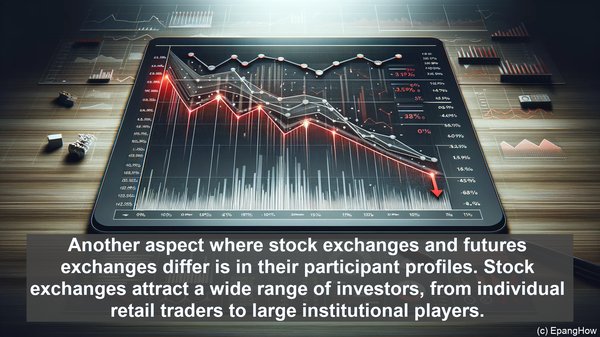Introduction: The Dynamic World of Financial Markets
Hello everyone! Welcome to our article on the differences between stock exchanges and futures exchanges. Financial markets are a fascinating realm, where millions of transactions occur every day. At the heart of this bustling ecosystem are stock exchanges and futures exchanges. While both facilitate trading, they operate in distinct ways. Today, we’ll dissect these differences, shedding light on their unique characteristics and functions.
Stock Exchanges: The Pillars of Equity Trading
Stock exchanges are synonymous with equity trading. They provide a platform for individuals and institutions to buy and sell shares of publicly listed companies. These exchanges, such as the New York Stock Exchange and NASDAQ, are highly regulated and operate during specific hours. Investors can trade stocks based on market orders or limit orders, with prices determined by the forces of supply and demand. Stock exchanges are known for their transparency, with real-time price updates available to all participants.

Futures Exchanges: Contracts for the Future
In contrast, futures exchanges deal with contracts rather than direct ownership of assets. These contracts, known as futures contracts, represent an agreement to buy or sell an asset at a predetermined price and date in the future. While stock exchanges focus on present ownership, futures exchanges are all about anticipating future prices. This makes them crucial for industries like agriculture, where farmers can lock in prices for their produce well in advance. Additionally, futures contracts can be traded even before their expiration, allowing for speculative trading and hedging strategies.
Leverage and Margin: The Futures Advantage
One of the key distinctions between stock exchanges and futures exchanges lies in the concept of leverage. In stock trading, investors typically need to pay the full price of the shares they buy. However, in futures trading, a concept called margin comes into play. Margin allows traders to control a larger position with a fraction of the total value. While this can amplify potential profits, it also increases the risk. Due to the leverage factor, futures trading requires a thorough understanding of risk management and market dynamics.
Market Participants: Diverse Profiles
Another aspect where stock exchanges and futures exchanges differ is in their participant profiles. Stock exchanges attract a wide range of investors, from individual retail traders to large institutional players. On the other hand, futures exchanges often see more participation from professional traders, including hedge funds and commodity trading firms. The nature of futures contracts, with their standardized sizes and expiration dates, makes them more suitable for certain types of trading strategies, such as arbitrage or spread trading.
Volatility and Risk: Varying Dynamics
Volatility, or the degree of price fluctuations, is another area of distinction. While stock markets can experience significant volatility, futures markets, especially those dealing with commodities or currencies, can be even more dynamic. Factors like geopolitical events, weather patterns, or economic indicators can have an immediate impact on futures prices. This heightened volatility can present both opportunities and risks, making it crucial for futures traders to stay updated with the latest news and market developments.

